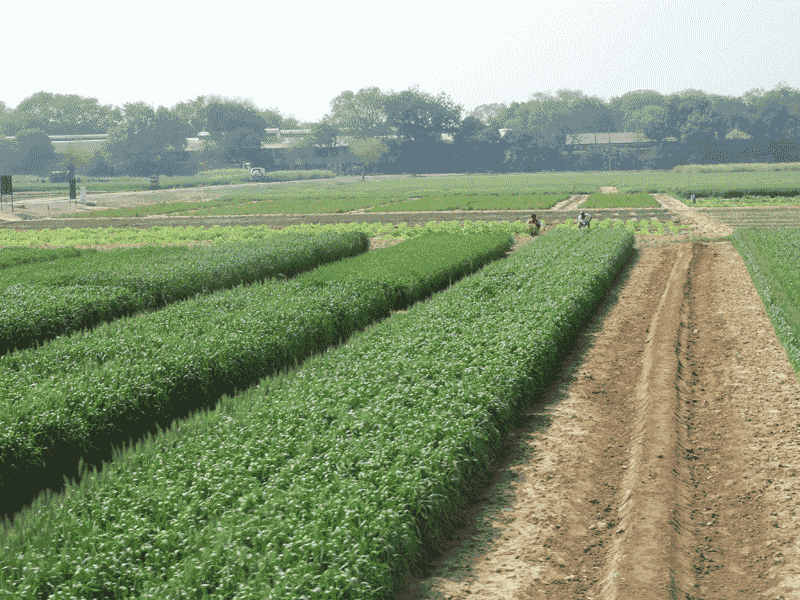A study tour of India
TRADITION AND TECHNOLOGY
with more than a billion people to feed, farmers play an important role in India. Most of them are small land holders in tribal villages with an average of five acres; however, they grow nearly everything that is needed: corn, wheat, lentils, fruits, vegetables, spices, tea, bananas, and cotton.
“It seems strange coming from Canada that they have such small farms and yet they produce so many crops,” said Todd Austin, Marketing Manager for Grain Farmers of Ontario and a member of Class 14 of the Advanced Agricultural Leadership Program (AALP). “In fact, they are one of the top producers of wheat in the world.”
Austin was able to get a first-hand look at farms, markets and cultural heritage sites around Delhi and Mumbai during a study tour to India with AALP earlier this year. The tour was designed to give program participants an understanding of agricultural trade, food safety and environmental issues through meetings with leaders in industry, government and academia. They were also provided with an overview of agricultural production and agribusiness in India.
a million different voices
During the two week program, Austin learned that one of the biggest challenges for the country’s agricultural industry is communication. With millions of farmers speaking thousands of different dialects, it is extremely difficult for the government and agricultural companies to pass along information and crop management techniques. However, Austin learned about several new programs that are making some headway.
A call centre established by Monsanto in Mumbai acts as a farmer advisory service centre. It reaches some 300,000 farmers through automated, customized proactive advisory voice messages with information on planting times and other agronomic information. “This works well for Monsanto because everyone has a cell phone,” said Austin. “And the centre is also a resource for farmers with specific crop and chemical advice; they have someone to call if they are having an issue.”

Austin also saw how Syngenta is helping to make farmers more progressive by teaching practices such as trickle irrigation through a peer learning program. “Rice is farmed during the monsoon season, but during the dry period, men often go to the city to work. New cropping practices, such as trickle irrigation, will allow crops to be planted and harvested during the dry periods when rice is not grown; this will encourage farmers to stay in their villages throughout the year.”
Social media is also playing a role in communicating with farmers in India. Digital Green is a company that creates local videos, voice recordings and posters highlighting various recommended farming practices for rural villages. So far, they have produced more than 2,500 videos and connected with more than 1,800 villages. “They have found that this network has led to a better uptake of information than with traditional extension workers because these videos and posters are communicating with farmers in their local language, using local people who farmers can connect with,” explained Austin.
more challenges
The study program also provided Austin with a better understanding of some of the other issues farmers and the agricultural industry are facing in India, such as infrastructure and supply distribution. “They are producing vast quantities of food. However, they need to have better infrastructure to solve their current distribution issue. Food is not that expensive, but it isn’t always being distributed appropriately.”
The tour gave Austin a sense of the vastness of India and allowed him to see some of the similarities and differences between our countries. He was left with an appreciation for the access to equipment and technology that farmers in Ontario have. “The equipment they use is rudimentary – a hoe, a rake – it involves a lot of manpower. It’s an entirely different way of farming,” he noted.
Austin said that even though his time in India was short, it was an invaluable opportunity to be able to participate in a study tour of India. “It is an eye-opening, awe-inspiring, enriching, yet humbling experience I will never forget.”
You can read about some of Todd Austin’s cultural adventures on the Growing Rural Connections blog http://growingrural connections.wordpress.com/.
AALP
The Advanced Agricultural Leadership Program (AALP) is a 19-month executive development program administered by the Rural Ontario Institute. It is targeted towards men and women involved in the agriculture and food sectors in Ontario who want to develop their leadership skills and increase their knowledge of the industry. The program includes a series of seminars and North American and international study tours.
Todd Austin, Marketing Manager for Grain Farmers of Ontario, was selected as one of 30 individuals to participate in Class 14, which began in September 2011.
“This program has given me the opportunity to understand agricultural issues from different viewpoints and it has encouraged me to think differently about important topics. It has also been a fantastic networking opportunity,” said Austin.
AALP was established in 1984. Class 15 will be run from September 2013 to March 2015. www.aalp.on.ca. •























